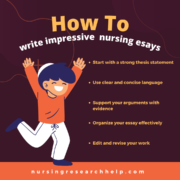Writing a Nursing Reflective Essay: Unveiling the 4 Biggest Success Tips for Nurses
Writing a Nursing Reflective Essay: Unveiling the 4 Biggest Success Tips for Nurses
Reflective practice is a cornerstone of the nursing profession, empowering nurses to enhance their skills, knowledge, and personal development. Nursing reflective essays serve as a powerful tool for nurses to explore their experiences, emotions, and thoughts surrounding specific incidents or situations encountered in their practice. In this blog post, we will delve into the significance of reflective essays in nursing, understand the reflective process, highlight the benefits of self-reflection for professional growth, and provide valuable tips for writing an impactful nursing reflective essay.

1. Understanding Reflective Practice
Reflective practice is a deliberate process that involves critically examining one’s experiences, actions, and responses in various clinical scenarios. It is a cyclical journey that incorporates observation, analysis, and evaluation to gain insights into personal strengths and areas for improvement. Reflective essays provide nurses with a structured platform to document and assess these experiences, enabling them to identify patterns, evaluate their performance, and enhance their practice.
By engaging in reflective practice, nurses are encouraged to think deeply about their actions, decisions, and the impact they have on patient care. It allows them to question their assumptions, biases, and preconceptions, leading to a more comprehensive understanding of the complexities of healthcare delivery. Reflective practice promotes an ongoing process of learning and growth, ensuring that nurses continually strive for excellence in their profession.
2. The Reflective Process
a. Description:
In this initial stage of the reflective process, nurses provide a detailed account of the event or incident they wish to reflect upon. They describe the context, setting, and individuals involved, ensuring a clear understanding of the situation. This description sets the foundation for a thorough reflection.
b. Feelings and Thoughts:
Nurses delve into their emotional and cognitive responses to the event, expressing their initial feelings, thoughts, and reactions. They consider how their emotions may have influenced their actions and decision-making during the incident. This introspection allows nurses to recognize their own biases and explore alternative perspectives.
c. Evaluation:
This stage involves an objective evaluation of the event, considering the outcome, patient outcomes, and the nurse’s own performance. Nurses analyze their actions, identifying strengths and areas for improvement. They reflect on their communication skills, technical proficiency, and adherence to professional standards. This evaluation helps nurses acknowledge their achievements and recognize areas where further development is required.
d. Analysis:
Nurses engage in critical analysis of the event, seeking underlying factors, patterns, and relevant literature or guidelines. They explore the impact of personal beliefs, values, and ethical considerations on their decision-making. They may reference research, best practices, or theoretical frameworks to gain a broader understanding of the situation and identify potential areas for improvement.
e. Conclusion:
In this final stage, nurses summarize their learnings from the reflective process. They outline the key insights gained, identify changes in their understanding or practice, and explore strategies for future improvement. This conclusion serves as a roadmap for personal and professional growth, providing a clear direction for further development and enhancement of nursing practice.

3. Benefits of Nursing Reflective Essays
a. Enhancing Critical Thinking:
Reflective essays foster critical thinking skills by encouraging nurses to question their actions, assumptions, and the evidence behind their decisions. This process promotes a deeper understanding of the complexities of patient care and encourages evidence-based practice. Nurses develop the ability to analyze situations from multiple perspectives and make informed decisions that prioritize patient safety and well-being.
b. Personal Development:
Nursing reflective essays promote self-awareness, emotional intelligence, and personal growth. Nurses gain a deeper understanding of their own values, beliefs, and biases, which allows them to provide more compassionate and patient-centered care. By reflecting on their experiences, nurses can identify their strengths and weaknesses, reflect on their interpersonal skills, and enhance their ability to empathize and connect with patients and their families.
c. Professional Growth:
Nursing reflective essays provide nurses with a platform to reflect on their professional development, identifying areas for improvement and formulating strategies for advancement. Through self-reflection, nurses can assess their competence in various aspects of nursing practice, such as clinical skills, leadership abilities, and communication. They can set goals for ongoing learning and development, ensuring they keep pace with evolving healthcare practices, technologies, and research.
d. Improved Patient Care:
By engaging in reflective practice, nurses can improve the quality of care provided to their patients. Nursjng reflective essays enable them to identify and rectify errors, enhance communication and teamwork, and ensure patient safety and satisfaction. Nurses gain valuable insights into their own performance, allowing them to make necessary adjustments to their practice to deliver optimal patient outcomes. Reflective practice encourages a proactive approach to addressing challenges and continuously improving the care provided.
4. Tips for Writing a Nursing Reflective Essay
a. Select an Appropriate Incident:
Choose an incident or situation that had a significant impact on your practice or personal growth. It should be relevant, recent, and conducive to deep reflection. Consider incidents that challenged your assumptions, presented ethical dilemmas, or highlighted areas for improvement.
b. Use a Structured Approach:
Follow a reflective framework, such as the Gibbs’ Reflective Cycle or the Johns Model of Reflection, to guide your nursing reflective essay. This structure will help ensure a comprehensive and organized reflection. Start by describing the incident, explore your feelings and thoughts, evaluate your actions, analyze the situation, and conclude with key learnings and action points.
c. Be Honest and Self-Critical:
Reflect on your actions and decisions with honesty and self-criticism. It is essential to acknowledge any mistakes or areas where you could have performed better. Nursing reflective essays are not meant to place blame but rather to promote growth and improvement. Recognize your strengths and weaknesses and explore strategies to build on them.
d. Connect Theory and Practice:
When researching your nursing reflective essay, explore relevant theories, guidelines, or evidence-based practices that relate to the incident. Consider how these resources could have influenced your actions or outcomes. Integrating theoretical knowledge with practical experience enhances your understanding and enables you to make informed decisions in future situations.
e. Focus on Learning and Growth:
Emphasize the lessons learned from the nursing reflective essay writing process. Identify specific actions or changes you will implement in your future practice to enhance your skills and improve patient care. Nursing reflective essays should demonstrate a commitment to ongoing learning and improvement. Share your plans for continuing professional development, such as attending relevant workshops, seeking mentorship, or engaging in further education.
Conclusion
Nursing reflective essays offer a valuable opportunity for self-reflection and professional growth. By engaging in the reflective process, nurses can gain insights into their actions, emotions, and thoughts, leading to improved critical thinking, personal development, and ultimately, enhanced patient care.
Embracing reflective practice allows nurses to continually evolve and adapt to the ever-changing healthcare landscape, ensuring the provision of high-quality, patient-centered nursing care. Through reflective essays, nurses can unlock their potential, foster empathy and compassion, and become lifelong learners committed to continuous improvement.

Nursing Assignment Help
At Nursing Research Help, we understand the challenges and demands that nursing students face in their academic journey. That’s why we are here to provide comprehensive assignment help services tailored specifically for nursing students. Our team of experienced and qualified professionals is equipped with in-depth knowledge of nursing principles, practices, and theories, ensuring that we deliver top-notch assistance for your assignments. Whether you need help with a nursing reflective essay, case studies, psychology assignments, research papers, or any other academic tasks, our experts are ready to provide you with the support you need.
We offer timely delivery, original and well-researched content, and a commitment to meeting your specific requirements. With our assignment help services, you can focus on honing your practical skills and gaining hands-on experience, knowing that your academic assignments are in capable hands. Trust us to help you achieve academic success and excel in your nursing studies. Contact us today to learn more about how we can assist you in your nursing assignments.












